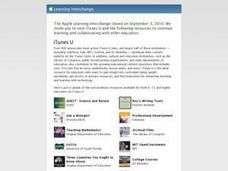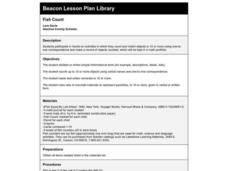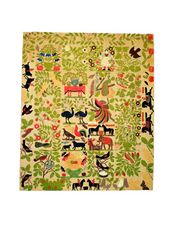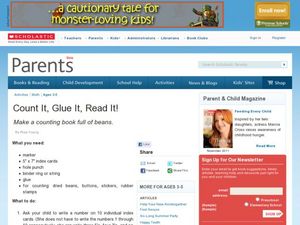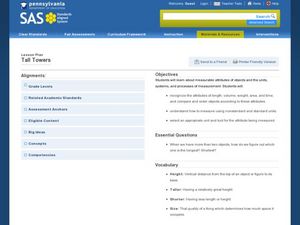Curated OER
Painting With Math
Learners write numbers and create drawings that demonstrate the grouping of objects. They write the numbers 1-10 on their paper, list a different object next to each number, and create an illustration that demonstrates the correct number...
Curated OER
We're Counting At The Zoo!
Budding mathematicians use sets of concrete materials to represent, count, and match quantities to 10 or more given in verbal or written form while participating in hands-on activities. This lesson uses the book 1, 2, 3 To The Zoo.
Bright Hub Education
Math Lesson for Visually Impaired Early Learners: A 3 Way Counting Activity
A unique lesson that's designed for visually impaired early learners, but can be adapted for anyone, is here for you. Pupils use brightly colored foam letters, beads, checkers, and an abacus, in order to gain practice in identifying the...
Curated OER
A Counting Photo Book
Students use iPhoto to create their own counting books. They come up with objects that can illustrate each number to 10. Working in pairs or individually, students use a digital camera to take photos of sets of objects to use in their book.
Curated OER
100th Day Celebration
Students celebrate the 100th day of school with a variety of math and language arts activities based on the number 100. They make books, count objects, and draw their predictions about life 100 years from now. They also estimate the...
Curated OER
Earth Day Number Sense
Elementary schoolers count and order objects using numbers 1-300. They bring recyclable items from home. Students group the items, skip count by 2's, 3's, and 5's, and arrange the items on a number line. Recyclable plastic bags are put...
Curated OER
Fish Count
Students participate in hands-on activities in which they count and match objects to 10 or more using one-to-one correspondence and make a record of objects counted, which be kept in a math portfolio.
Curated OER
Basic Counting Principle
Students find the number of possible arrangements of several objects by using the Basic Counting Principle. In this math lesson, students divide into groups and determine the number of possible sandwiches which can be made given certain...
Curated OER
Counting Quilts
Students view the Bird of Paradise quilt and observe the design-work in the quilt. For this counting quilt lesson, students will count to find repeated pictures in the quilt. Students will represent their families...
Curated OER
Counting Books
Students create counting books. In this counting book activity, students make their own book which counts on each page and has a corresponding picture. These books can count by 1's, 2's, 5's, or even fractions.
Indiana Science
How Many E’s?
Seventh graders explore random sampling by estimating the number of e's on the newspaper. They explain the possible error sources for this type of sampling, and compare the accuracy of sampling a small and large population. This is a...
Curated OER
Count Around
Students explore counting. For this numeration math lesson, students read a question that poses a "counting" question, count the identified classroom objects, and write their answer on a sticky note. Students place their note...
Curated OER
Teaching Arithmetic and Math Concepts to Headstarters
Learners discover early number concepts for numbers 1 through 5. In this number concepts instructional activity, students work in stations doing hands-on activities such as sorting colored blocks, stringing beads, and counting sticks....
Curated OER
The Ten Little Indians Count
Students engage in a fun, hands-on activity that uses a Thanksgiving theme to incorporate one-to-one counting to 10. They utilize a worksheet imbedded in this plan to help them with their counting skills.
Curated OER
Count it, Glue it, Read it!
Young scholars identify numbers 1-10 and count objects to match corresponding numbers. In the number sense instructional activity, students create a counting book, matching numbers they've written on index cards with the correct number...
Curated OER
So Fast! So Slow!
Fifth graders give examples of objects that move slow and fast. In this physics lesson, 5th graders rank animals according to how quickly they move. They create a bar graph of organisms versus rates of speed.
Curated OER
Tall Towers
Linear measurement is the focus of this math lesson. Youngsters work in groups to build towers with blocks. They build towers represented on index cards and determine how many blocks taller one tower is.
Curated OER
A Weigh we Go!
Here are some cross-curricular activities whil should help your kids understnad weight measurements and grammar. In this grammar and math lesson, learners read the book Skittles Riddles and practice counting and balancing skittles. They...
Achieve
Dairy Barn
Agriculture is truly a math-based profession! Help the dairy farmer determine the supplies needed to complete his barn. Using given dimensions, learners build equations and use units to determine the correct amount of materials.
Curated OER
Math All Around Us!
Students find math concepts in every day items. In this math concept lesson, students take ten photographs of things they find interesting. They analyze the photographs to find hidden math concepts such as counting, lines, angles,...
Curated OER
Flipping with Math
Students write simple addition number sentences. In this addition lesson, students write simple addition number sentences using tangible objects as their guide. Using a paint or drawing program on the computer, students create a visual...
Curated OER
Make-Your-Own Math Practice
Students create their own math practice book. In these homemade book lessons, students create their own counting, number, and shape pages. When the pages are complete, they are bound together in a book.
Alabama Learning Exchange
Yummy Apples!
Young learners listen to a read aloud of Gail Gibbons book, Apples and the story A Red House With No Windows and No Doors. They compare characteristics of a number of kinds of apples, graph them and create a apple print picture. Learners...
Curated OER
Spark Activity: Counting Laps
Students move around a makeshift "track" set up by the teacher, moving around it as many times as they can before the stop signal. Students begin by power walking and slow-jogging, then build up speed as they proceed. Students call out...



